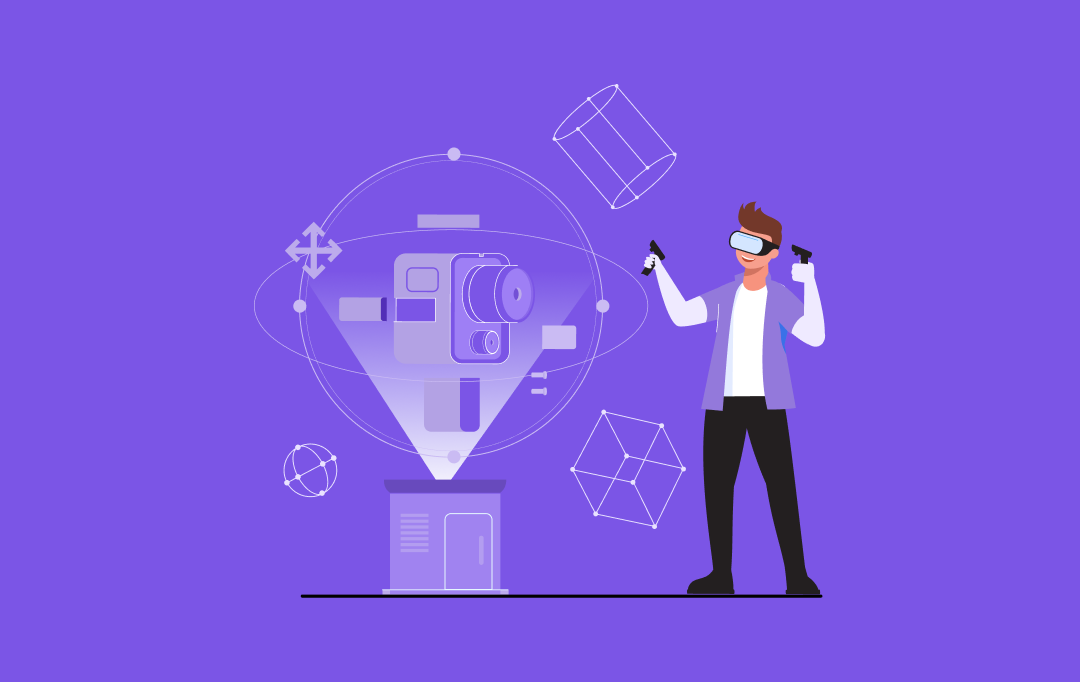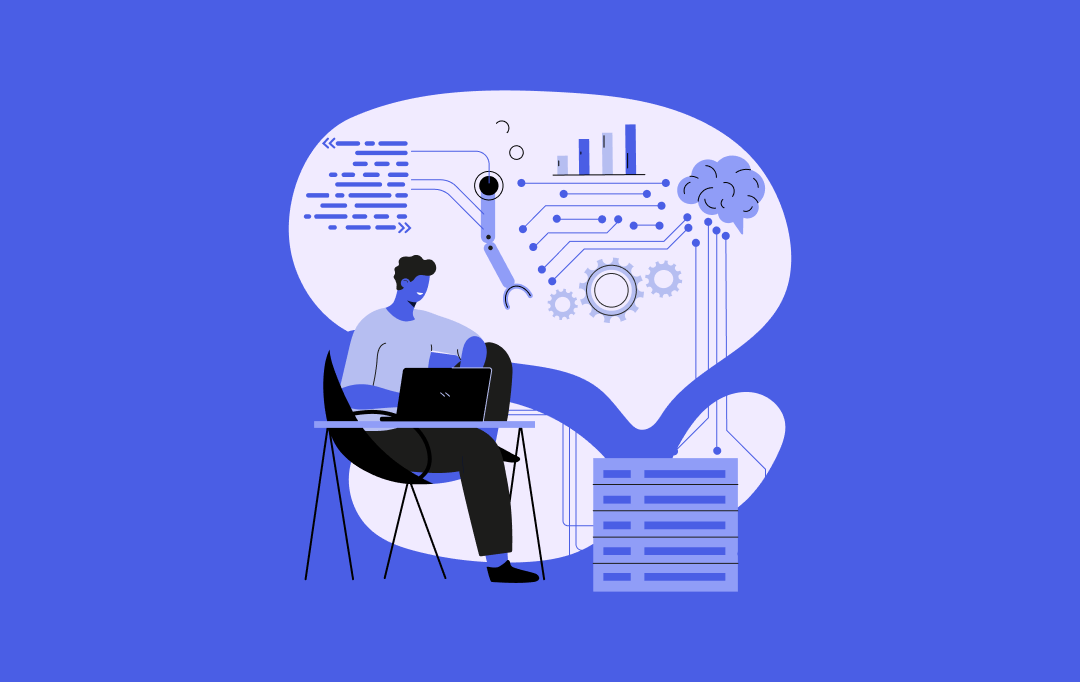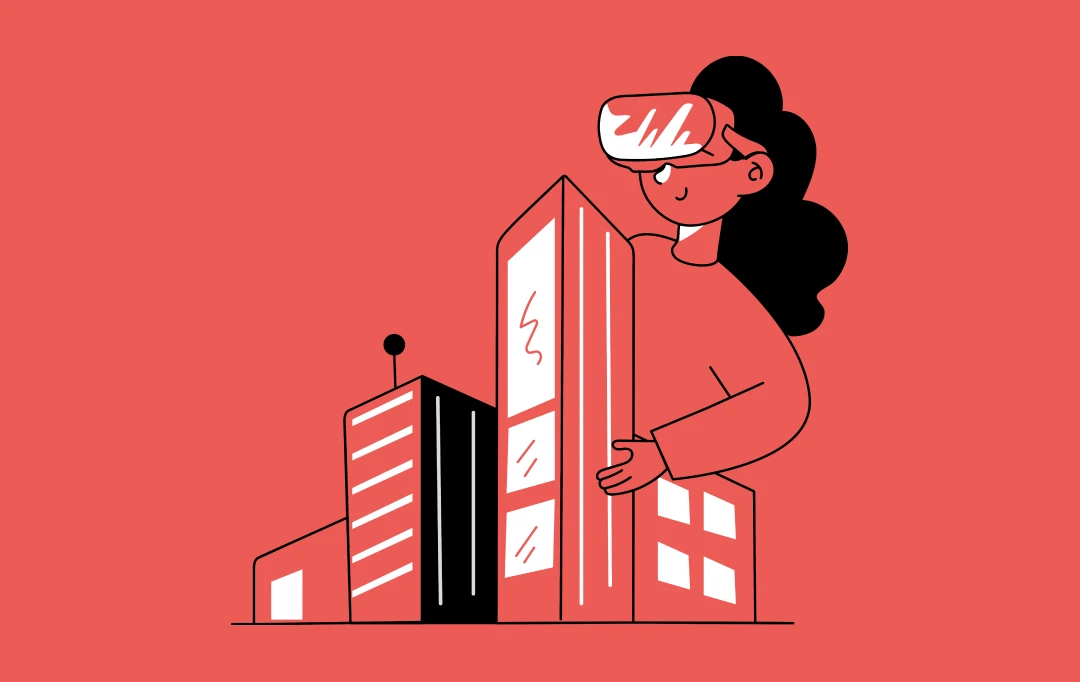- Understanding the Impact of AR/VR in Dubai: What Businesses Need to Know
- Benefits of AR/VR Technology Adoption in Dubai's Technical Landscape
- Efficient Training Environments
- Streamlined Operations
- Dynamic Marketing Tools
- Promotion through Immersive Experiences
- Industries Leveraging AR/VR Integration in Dubai
- Retail
- Real Estate
- Education
- Healthcare
- Construction
- Manufacturing
- Tourism
- Automotive
- Entertainment
- Public Safety
- Marketing
- Real-World Examples of Businesses in Dubai Leveraging AR/VR in Their Operations
- Emaar Properties
- Dubai Mall's VR Park
- Mohammed Bin Rashid University of Medicine and Health Sciences (MBRU)
- American Hospital Dubai
- Decoding the Future of AR/VR Technology in Dubai
- How Appinventiv Dubai is the Right Partner for Bridging the Gap Between Emerging AR/VR Technology and Business Innovation in Dubai
- FAQs
Dubai’s Marvel theme park isn’t the only groundbreaking innovation capturing the world’s attention. The city is also making significant strides when it comes to experimenting with technologies like Augmented Reality (AR) and Virtual Reality (VR), pushing the boundaries of what’s possible in digital engagement.
As a hub of technological advancement, Dubai, UAE is leveraging these immersive technologies to transform industries and enrich daily life, making it a beacon for global innovators.
Dubai is broadening the applications of AR/VR across vital sectors like tourism, healthcare, education, and public administration. This isn’t just an enhancement of existing systems but the creation of completely new experiences. For instance, with the help of innovative apps, tourists can take virtual tours, exploring and immersing themselves in historical monuments through virtual reality. Meanwhile, in healthcare, AR has the power to provide surgeons with 3D visualizations during procedures, significantly improving accuracy and patient outcomes.
In this blog, we will explore the role of AR/VR in Dubai across multiple key sectors. You will witness different examples of how these technologies simplify daily tasks and enhance experiences, from virtual shopping to interactive learning. In addition to this, we will also highlight how these AR/VR innovations in Dubai are changing everyday life and showcase the practical benefits of these technologies in a city that’s always looking to the future.
Understanding the Impact of AR/VR in Dubai: What Businesses Need to Know
As local businesses continue to embrace virtual and augmented reality in Dubai, capitalizing on these technologies to drive maximum ROI and enhance their competitive edge has become rather vital across all the sectors. The investment in AR and VR is not just about adopting new technologies but also about leveraging them to transform business models and consumer interactions in ways that significantly boost profitability and market presence.
The use of AR and VR in Dubai is rapidly expanding, which is actually driven by the city’s commitment to maintaining its status as a leading global technology hub. This growth can be witnessed in the impressive AR and VR market in the United Arab Emirates, which is expected to reach a revenue of $204.2 million by 2029, witnessing a CAGR of 9.67% from 2024 to 2029.
This expansion is attracting local businesses and drawing international investors to tap into the growing tech-savvy consumer base. As AR and VR technologies become more integrated into everyday business practices, companies across sectors are finding innovative ways to reduce costs, increase sales, and deliver unique customer experiences.
As the market of AR/VR in Dubai grows, businesses are further finding substantial opportunities for growth. Companies that effectively adopt these technologies can enhance operational efficiency and create engaging, personalized customer experiences. This not only boosts customer satisfaction and loyalty but also helps attract new customers and retain existing ones, thereby amplifying their market impact.
Furthermore, the Dubai government also plans to leverage AR/VR technologies as part of its broader Dubai Metaverse Strategy which aims to transform the emirate into a leading metaverse economy and global hub for new technologies. The strategy focuses on integrating AR and VR to enhance sectors such as tourism, education, healthcare, and legal services. By adopting these technologies, the government wishes to create more immersive, efficient, and interactive services that align with its vision for a digitally advanced Dubai.
According to a report by GulfBusiness, Dubai has also embraced AR/VR to enhance guest experiences and showcase its attractions in a new way. The Dubai Department of Economy and Tourism (DET) has introduced virtual tours of famous landmarks, like the Burj Khalifa and Dubai Creek, through platforms like VisitDubai.com. These technologies allow people to explore Dubai’s iconic sites from anywhere in the world. Additionally, VR is used in destination weddings, offering unique post-wedding experiences and live streaming for guests who can’t attend, highlighting Dubai’s commitment to using technology to create memorable and personalized experiences.
Are you still wondering if it’s the right time to invest in VR/AR solutions for your business? Let’s make it easy for you.
Pentagon Games, a Dubai-based startup, recently made headlines by securing $6 million in seed funding to enhance its AR, VR, and AI-driven Web3 gaming platform. This significant financial boost reflects investor confidence in Pentagon Games’ innovative approach to revolutionizing the gaming industry.
[Also Read: Web3 and the Metaverse: Building a Stronger Digital Economy]
By leveraging cutting-edge technologies, the company aims to create immersive gaming experiences that surpass traditional gaming practices, offering players unique and enriching interactions within their gaming environments.
Thus, if you are ready to stay innovative in this evolving ecosystem, investing in AR/VR innovations in Dubai can also be a strategic investment that can guarantee long-term success for your businesses.
Benefits of AR/VR Technology Adoption in Dubai’s Technical Landscape
Integrating AR/VR technologies in Dubai sets a new standard in the city’s technical landscape, positioning it at the forefront of digital innovation. Here are some key benefits that these technologies bring to various business sectors across the city:
 Enhanced Customer Experiences
Enhanced Customer Experiences
AR and VR technologies are vital to transforming how customers interact with services and products across various sectors, including retail, tourism, and real estate. These technologies provide immersive and interactive environments that elevate traditional customer service methodologies into more engaging and memorable experiences.
Efficient Training Environments
These technologies offer innovative training solutions that are both effective and engaging, allowing the employees to gain practical experience with the help of simulation, without the risks associated with physical training. This leads to better preparedness and skill enhancement across various sectors.
Streamlined Operations
Talking about AR, the technology has the power to help businesses streamline their operations by integrating virtual data overlays that assist in complex procedures and decision-making processes. This capability reduces time and resource expenditure, increasing overall efficiency. By partnering with an experienced software company in Dubai, businesses can seamlessly integrate AR/VR solutions, which will drive their operational efficiency.
Dynamic Marketing Tools
Utilizing AR for marketing allows businesses to present their products in unique ways that more effectively captivate consumer interest. This includes virtual product demonstrations and interactive advertisements that drive consumer interaction and sales.
Promotion through Immersive Experiences
VR apps allow potential tourism businesses to offer their customers virtual tours of attractions, enriching the travel experience and boosting tourism by providing a taste of what is unexpected. This not only enhances the appeal of destinations but also helps planners plan visits more effectively.
After looking at the benefits of AR/VR in Dubai, let’s move ahead and look at the multiple sectors that are implementing the use of AR/VR solutions in their daily operations and getting amazing results.
[Also Read: How AI, IoT, and AR/VR Technologies are Helping Companies Achieve their Sustainability Goals]
Industries Leveraging AR/VR Integration in Dubai
Industries across Dubai are increasingly incorporating AR/VR into their core operations, revolutionizing traditional business approaches and enhancing customer engagement. Let us look in detail at how the technology like AR/VR in the UAE are revolutionizing these multiple sectors:
 Retail
Retail
In retail, Augmented Reality ecosystem transforms how customers shop by allowing them to see products in their own space before making a purchase. This helps in making more informed decisions, thereby reducing return rates and increasing satisfaction.
Conversely, virtual reality offers customers a unique way to browse virtual showrooms and experience products as if they were physically present. This leads to increased sales and enhanced shopping experiences.
[Also Read: AR in eCommerce – 10 benefits, use cases, and real-world examples for businesses]

Real Estate
The real estate business benefits greatly from AR and VR by offering potential buyers virtual tours of properties, making it one of the most sought-after AR/VR use cases known to businesses in Dubai. This allows your clients to explore properties conveniently, reducing the need for physical showings .
According to a report from Khaleej Times, real estate agencies in Dubai are already utilizing AR and VR technologies to enhance the home buying experience. These tools allow potential buyers to explore properties in a virtual environment, offering immersive and interactive property tours. This integration of technology simplifies the buying process, saves time, and helps buyers gain a thorough understanding of the property’s layout and features before making a decision.
Real estate startup businesses in Dubai benefit greatly from AR and VR by offering potential buyers virtual tours of properties. This is one of the most sought-after AR/VR use cases known to businesses in Dubai. It allows your clients to explore properties conveniently, reducing the need for physical showings.
Education
Educational institutions in Dubai are adopting VR apps to simulate real-world environments where students can practice and learn in safe, controlled conditions. This hands-on approach enhances understanding and retention. AR, on the other hand, makes learning more interactive by adding digital details to physical books and classrooms, making lessons more engaging and impactful.

Healthcare
In healthcare, VR is used for surgical training and patient care simulations, providing healthcare professionals with a safe space to sharpen their skills and enhance patient outcomes. Augmented reality in Dubai, on the other hand, supports surgeons during procedures by displaying essential data like medical imaging directly on the patient’s body, increasing accuracy and safety.

Construction
AR is vital in construction for overlaying project plans on actual sites, helping identify and fix mistakes early, which saves costs. VR, on the other hand, enhances safety training by simulating hazardous conditions safely, preventing accidents and ensuring compliance with safety regulations.
Manufacturing
In manufacturing, AR provides workers with real-time data and visual instructions right on the equipment, reducing errors and minimizing downtime. This boosts productivity and improves operational efficiency.
Tourism
Tourism is another popular use case that has refined the landscape of virtual reality and augmented reality in the UAE. For instance, VR applications allow tourists to explore destinations virtually before making travel plans, enhancing their ability to make informed decisions and potentially increasing tourism revenue by appealing to hesitant travelers.
AR also adds to the real-world travel experience by providing interactive and informative content, enriching visits with useful and historical insights.

Automotive
AR/VR in Dubai’s ecosystem accelerate vehicle design and testing in the automotive industry, enabling quicker innovation. In showrooms, these technologies allow customers to virtually customize and experience car features, improving satisfaction and aiding in decision-making.
Entertainment
The entertainment sector employs VR to create captivating experiences like virtual concerts, games and rides, drawing a larger audience. AR, on the other hand, introduces interactive elements to live events and venues, enhancing engagement and making experiences more memorable.

Public Safety
AR and VR allow law enforcement and first responders to train in realistic, controlled scenarios, better preparing them for real-world challenges. This training enhances their responsiveness and decision-making in emergencies.
Marketing
AR revolutionizes marketing processes by creating interactive ads that let consumers engage with products in unique ways. Conversely, VR is used for deep, immersive storytelling, drawing customers into the brand’s world, enhancing engagement and fostering brand loyalty.
After looking into AR/VR use cases across multiple industries, let’s move ahead and check out various examples of real-world businesses that are looking to redefine their operational efficiencies by integrating AR/VR.
Real-World Examples of Businesses in Dubai Leveraging AR/VR in Their Operations
Business landscape is rapidly transforming through the implementation of AR/VR technologies in Dubai. These innovations are enhancing how businesses operate while helping them in redefining the consumer interactions. Here are some real-world examples of businesses leveraging AR/VR in Dubai to drive growth and innovation across various sectors.
 Emirates Airlines
Emirates Airlines
One of the well-known examples of businesses leveraging virtual reality and augmented reality in the UAE is Emirates Airlines. This aviation giant has implemented VR technology to enhance its customer service training programs. By using VR, Emirates allows its crew to experience and manage a wide range of in-flight scenarios, leading to improved service standards and readiness for real-world challenges.
Emaar Properties
In the real estate sector, Emaar is redefining the use of VR tours to showcase their properties. Prospective buyers can virtually visit different properties, experiencing their layouts and amenities from anywhere in the world. This growing use of virtual reality and augmented in Dubai significantly enhances users’ buying experience.
Dubai Mall’s VR Park
VR park in Dubai Mall is a great example of how the entertainment and retail sector is integrating the use of VR to attract more business. The VR Park offers visitors immersive rides and experiences, ranging from horror adventures to futuristic explorations, drawing a vast crowd and providing a unique shopping and entertainment experience.
Mohammed Bin Rashid University of Medicine and Health Sciences (MBRU)
MBRU has been actively integrating VR technology to provide medical students with immersive training environments. These VR setups allow students to experience complex surgical procedures and patient interactions in a controlled, virtual space, enhancing both their learning and practical skills without the risks associated with real-life procedures.
American Hospital Dubai
American Hospital Dubai uses AR to assist surgeons during complex procedures. This technology provides surgeons with enhanced visualizations, overlaying crucial information and imaging directly onto the patient’s body during surgery. This integration of AR helps improve precision and outcomes, significantly reducing risks associated with complex medical procedures.
Decoding the Future of AR/VR Technology in Dubai
AR/VR technologies in Dubai are expected to transform various sectors in the upcoming years, enhancing how businesses operate and interact with customers. Let’s see how Dubai is expected to maintain its status as a leading technology hub with AR/VR leading its vision:
Retail and eCommerce
AR and VR will revolutionize shopping by creating personalized virtual shopping experiences that adapt to user preferences with AI assistance. This innovation is set to transform consumer interactions, making shopping more engaging and tailored.
Real Estate
In real estate, AR/VR technologies in the future could enable buyers to design and modify properties in a virtual environment before actual construction, enhancing decision-making and boosting investment confidence.
Healthcare
Education
Educational advancements will likely include immersive VR programs that simulate real-world professional environments, allowing students to experiment and solve real problems. This will better prepare them for their careers.
Tourism
Tourism might introduce fully interactive virtual reality experiences that allow explorers to visit and interact with destinations virtually. This will pave the way for more enhanced travel planning.
Construction
In construction, AR and VR could be used to simulate entire projects before physical work begins, testing structures under various conditions and optimizing construction processes to minimize risks and costs.
As Dubai integrates AR (Augmented Reality) and VR (Virtual Reality) more deeply into its business practices and public sectors, these technologies will drive innovation, enhance operational efficiency, and attract further investment, maintaining Dubai’s position as a global hub of futuristic technologies. Thus, simply put, the future of AR/VR technology in Dubai seems exceptionally bright, backed by maximum RoI and greater profits.
How Appinventiv Dubai is the Right Partner for Bridging the Gap Between Emerging AR/VR Technology and Business Innovation in Dubai
We hope this blog has made you understand how implementing AR/VR in your services is now a necessity in Dubai’s growing ecosystem. While looking at the future trends of AR/VR in Dubai, businesses can expect a continuous evolution and integration of these technologies into various sectors.
At Appinventiv Dubai, we recognize the transformative impact of AR/VR across various sectors and how it can impact a dynamic market like Dubai. Our approach leverages these advanced technologies to meet the specific needs of businesses looking to innovate and expand their digital footprint.
As a dedicated AR/VR development services provider, our team of experts can ensure the technology solutions we deliver for your business are backed by the latest insights as well as are strategically aligned with the unique dynamics of the Dubai market. Whether it’s enhancing customer engagement, streamlining operations, or creating immersive brand experiences, our customized AR and VR solutions guarantee to deliver substantial business value.
Partnering with us can now help you leverage the new technologies but also embrace a partnership that is committed to innovation, excellence, and transformative business outcomes. Our approach has empowered businesses like KFC, Adidas, EdFundo, IKEA, Edamama, Y.K. Almoayyed & Sons, Pizza Hut, Hukoomi and more to harness the full potential of digital innovation, setting new standards in their respective industries.
Get in touch with our experts to unlock the potential and role of AR/VR in Dubai to propel your business towards unprecedented growth and success in the city’s ever-evolving tech landscape.
FAQs
Q. How is AR/VR transforming Dubai?
A. AR/VR in the UAE are significantly changing many industries. These technologies are making shopping more interactive for the customers, educational training more immersive for the students and tourism more engaging for the tourists. In addition to this, they are also helping doctors perform complex surgeries with more precision and letting students experience lifelike educational simulations. As Dubai integrates these technologies more deeply, they are bound to drive innovation and efficiency, attracting even more investment into the city.
Q. What is the cost of AR/VR software development in Dubai?
A. The cost of developing AR/VR software development in Dubai can vary from $50,000 to $350,000. The entire budget to integrate AR/VR technologies in Dubai is further dependent on several factors like the complexity of the software, features to be integrated, location of the hired development team, etc.
Additionally, the choice of technology stack and the need for specialized skills to create advanced AR/VR experiences can also impact the overall development costs. With AR/VR in the MENA region gaining momentum, understanding these costs and factors has become crucial for successful implementation of projects.
It’s important for businesses to clearly define their requirements and choose a development partner who can offer both expertise and value to ensure that the investment is worth the money.
[Also Read: How Much Does Mobile App Development Cost in Dubai, UAE?]
Q. What are the benefits of investing in AR/VR technologies for businesses in Dubai?
A. Investing in AR/VR in Dubai offers businesses a competitive edge by enhancing customer experience and operational efficiency. AR/VR-powered software can help reduce training costs, increase sales through innovative marketing strategies, and improve service quality. With a focus on becoming a global tech hub, embracing technologies like Virtual Reality and Augmented Reality in Dubai is not only strategic but also necessary for staying relevant and profitable in an increasingly digital world.



10 Use Cases and Examples of How Extended Reality (XR) is Driving Innovation Across Industries
Imagine a factory where engineers diagnose machinery issues using 3D holograms or a hospital where surgeons rehearse complex procedures in a fully immersive virtual space before operating on a real patient. These scenarios are not distant possibilities - they are happening today and are powered by Extended Reality - XR use cases. As a convergence…

13 Use Cases and Examples of How Adaptive AI is Transforming Industries
Slashing downtime, boosting margins, automating workflow, and stealing your market share. You must be thinking that these buzzwords are Silicon Valley’s hype. No, these are the silent revolutions hitting Main Street industries. From manufacturing deploying demand forecasting to controlling production lines, healthcare tailoring predictive care and driving better outcomes. The success mantra—these industries are quietly…

AR/VR in Construction - 10 Use Cases of How Augmented and Virtual Reality is Shaping the Industry
The use of extended reality technologies is one of the growing trends in the expanding domain of construction technology. As the sector gradually adopts more sophisticated practices, virtual and augmented reality in construction have emerged as revolutionary solutions. With compelling advantages like planning, marketing, and training, AR/VR technologies are transforming the face of construction. Prescient…

















